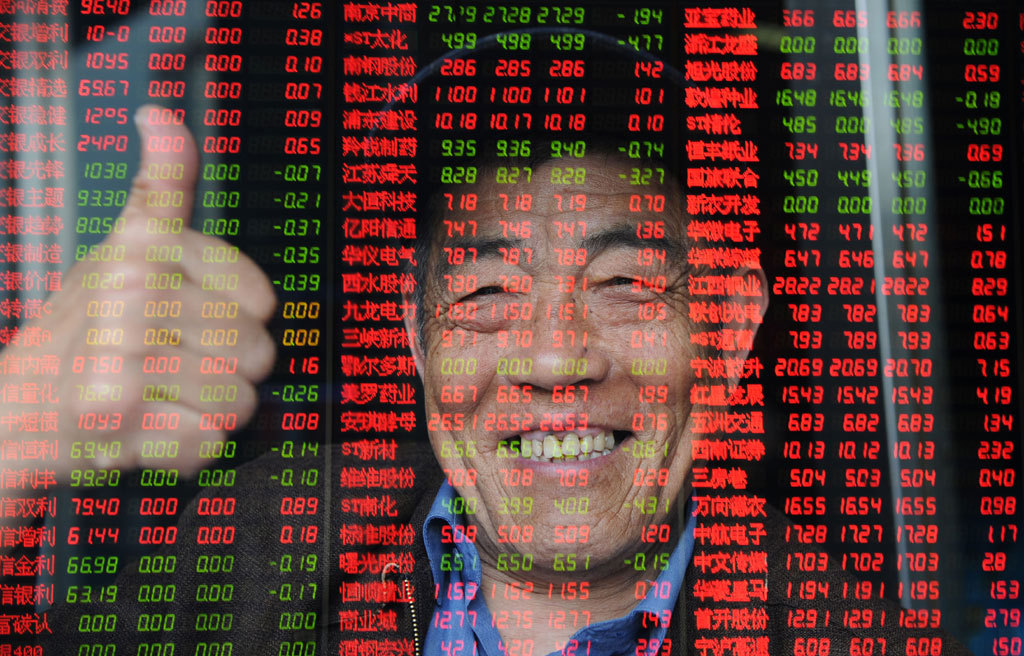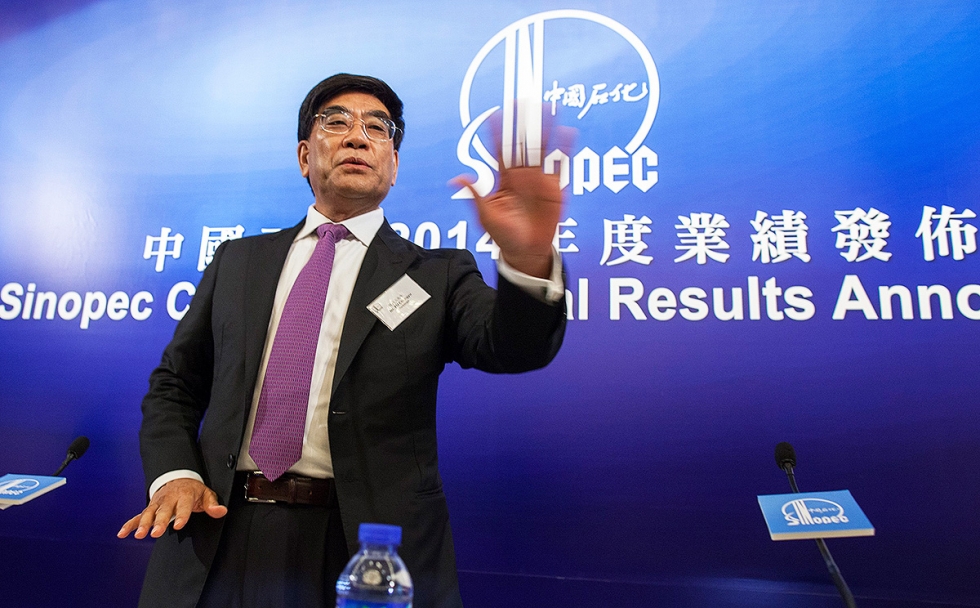Pigs Can Fly: Chinese May Day Celebration Criticized for Pushing Pigs off Bridge. The Telegraph, May 4th
As May Day demonstrators battle police in countries across the world, from South Korea to the US West Coast, tourism officials in Hunan concocted a controversial holiday attraction using literal pigs:
“A tourism official in central China came up with a novel way of entertaining visitors to Shiyan Lake, by creating a show featuring “flying” pigs.
The animals were herded onto a bridge above the lake in Changsha. Identified by red numbers painted on their sides, the pigs were then driven off the bridge by a man holding a stick, and splashed into the water below.”
China’s Crazy Stock Market, Charted. Bloomberg Business, May 4th.
Pigs aren’t the only things flying, as China’s stock market continues to skyrocket. Awash with speculative cash, the bubble just keeps growing:
“At 3.2 percent of total market cap, China’s margin debt has already eclipsed bubble-era Japan as well as pre-Asian Financial Crisis Korea.”
China, Pursuing Strategic Interests, Builds Presence in Antarctica. New York Times, May 3rd.
Signing a new agreement with Australia, China secures access to the quickly melting South Pole:
“Standing on the deck of an icebreaker that ferries Chinese scientists from this last stop before the frozen continent, Mr. Xi pledged that China would continue to expand in one of the few places on earth that remain unexploited by humans.”
China appoints new chairmen at top three oil companies. The Straits Times. May 4th.
Different kinds of restructuring are beginning to be felt in China’s corruption-riddled natural resource industries, strained by the economic slowdown:
“China has appointed new chairmen for the country’s top three energy groups, according to company statements on Monday, in a top-down reshuffle of the industry which faces the challenges of spending cuts, low oil prices and easing demand.”
China’s State-Owned Oil Company’s Corporate Reshuffle Part of Xi Jinping’s State Sector Merger Plans. International Business Times, May 4th.
Alongside his anti-corruption drive, Xi Jinping is seeking to again reduce the size and scope of China’s state-owned sector through a new wave of state-led consolidations:
“The new leaders will take the helm during a particularly difficult time for China’s government-owned companies as more mergers and job cuts are expected in the near term. Huge oil conglomerates have faced increasing scrutiny as global crude prices drop. Last week, Xi announced plans to reduce China’s number of state-run conglomerates from 112 to 40. China’s state-owned companies account for about one-third of the nation’s economy, but more than a quarter lose money, Bloomberg reported, citing a financial note by Barclays last August.”
China Oil Industry, Experts Resist Proposal to Merge Companies. The Wall Street Journal. May 4th.
But the restructuring of the industry has also unveiled differences of opinion on how it should be restructured—via consolidation, a la Xi’s plan, or via privatization and marketization, as preferred by the industry executives:
“But oil-industry executives are arguing that Chinese consumers would be better served by more market-driven overhauls instead of government-driven consolidations, people familiar with the discussions said. “There is big pushback from the industry,” said one of those people, who is familiar with the deliberations at the state-owned Assets Supervision and Administration Commission, which oversees large state companies, including the oil giants.”
China’s miners step up protests as industry downturn continues. China Labor Bulletin, April 28th.
Industry executives aren’t the only ones opposing the industry’s restructuring:
“Workers in China’s coal, iron ore, gold and silver mining industries have all taken to the streets in protest this year as the economic slowdown continues to impact on mining companies across the country.”
China gov’t cancels green festival as public consciousness on environment grows. China Dialogue. April 28th.
An on the other end of resource extraction:
“China’s best-known environmental group, Friends of Nature, asked people not to turn up to its Beijing Earth Day Environmental Protection Festival after Beijing police said the event was not permitted to go ahead and that the “online impact” of the event be toned down.”
Real Estate Billionaire Wang Jianlin Is Back On Top As China’s Richest Man. Forbes. May 3rd.
As resource extraction falters, Real Estate comes out on top:
“Wang, a soft-spoken Chinese army veteran and former bureaucrat in the northeastern Chinese city of Dalian, has been busy in the past year adding real estate abroad, announcing luxury projects in Beverly Hills, Chicago and Australia. Wang also controls AMC Entertainment, the U.S. theatre chain whose shares in New York. The New York Times in a report on Friday highlighted ties between Wang’s real estate business and the families of top officials of China’s Communist Party.”
Wang Jianlin, a Billionaire at the Intersection of Business and Power in China. The New York Times. April 28th.
Some background on Wang, again China’s richest man:
“How the son of a foot soldier in Mao Zedong’s Communist Revolution catapulted into the top tier of the global elite is an archetypal story of China’s transition to capitalism and the outsize opportunities it presents those with talent or connections — or, in Mr. Wang’s case, both. His story, though, is also singular: He built one of the world’s most valuable real estate portfolios in a nation where the state retains ownership of all land.”
Who Owns Shares in Wang Jianlin’s Empire? Names Are Just a Start. The New York Times, April 28th.
Tracing out the dimensions of Wang’s Real Estate Empire:
“But identifying Ms. Yang and other investors in Mr. Wang’s real estate and entertainment empire was a complicated task. While the Chinese government has improved access to business records in recent years, shareholders often cloak their investments through layers of holding companies. And even when a name is disclosed, it can be meaningless without additional identifying information.”
Two Nantong thieves arrested after managing to steal a road. Shanghaiist. April 28th.
Meanwhile, two dudes in Jiangsu province make their own real estate investment:
“Seeing as the village committee hadn’t approved a plan to remove the road, police got down to business to discover how, exactly, the thing could’ve seemingly disappeared overnight.
Actually, it was two days. That’s how long it took for two men, identified as Gu and Yang, to dig out more than 630 tons of concrete slabs with an excavator and truck—without anybody noticing.”
Rent-a-Foreigner in China. New York Times. April 28th.
And if party connections or road-theft don’t pan out, you can always rent-a-foreigner to improve your property values:
“The operation usually works by recruiting a few of the thousands of ordinary expatriates in China, and paying them to play whatever role the client feels will best convey its building’s desirability. Musicians and models — often amateurs billed as “famous” — are the most popular personas. But while making this video we also encountered Westerners posing as businessmen, athletes, diplomats and some simply as city residents.”



